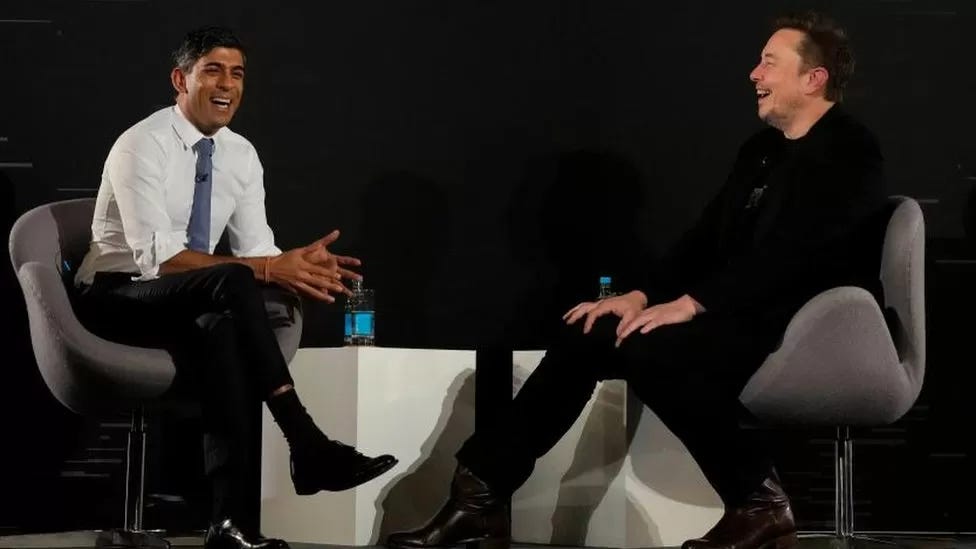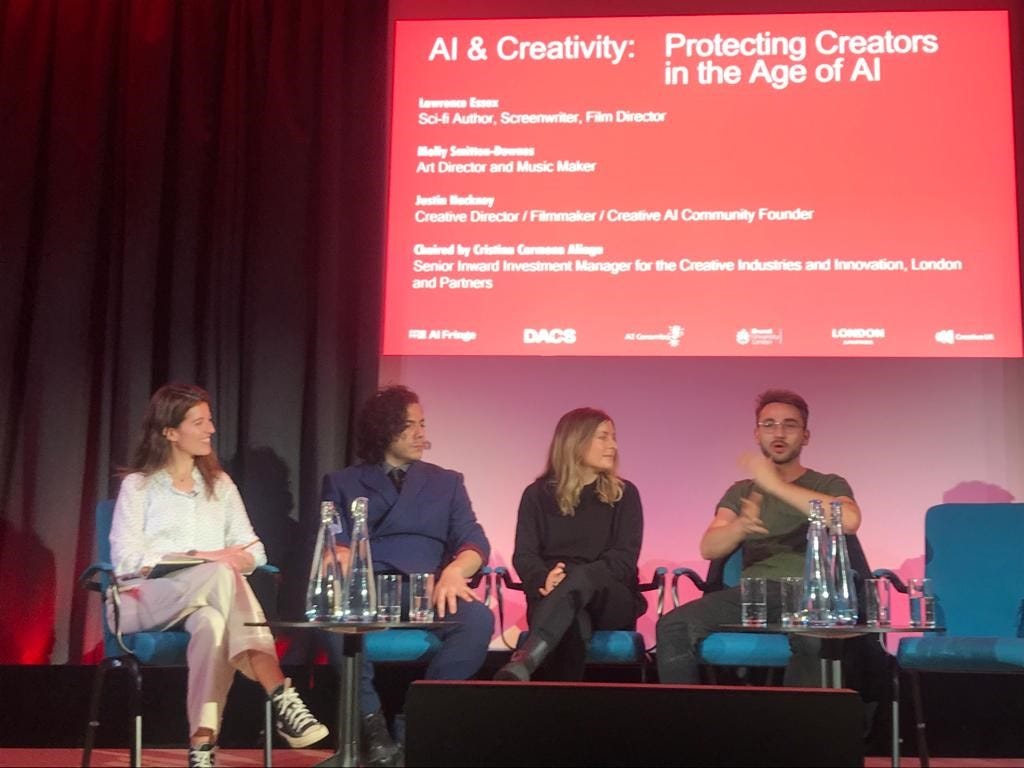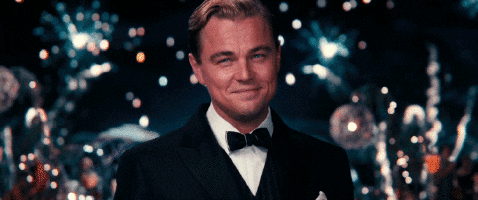All Aboard the AI Express
The first global AI Safety Summit has come and gone but this is only the beginning of the conversation on the future of AI

Like a shooting star the AI Safety Summit has quickly made its way through the UK and those who managed to spot it -the conversations at Bletchely Park were behind closed doors- surely took the opportunity to make a wish.
I won’t be telling you about the key takeaways or major announcements because by now you probably have read about that at length. Neither will I discuss the conversation that Elon Musk and Rishi Sunak had because it can be watched here.
However, I will highlight one thing from it - the statement that made headlines shortly after it left Musk’s lips:
"There will come a point where no job is needed - you can have a job if you want one for personal satisfaction but AI will do everything. It's both good and bad - one of the challenges in the future will be how do we find meaning in life"
That is indeed the underlying question on the whole future of AI debate.
Technological progress is not something the human race is unfamiliar with, nor the disruption it comes with it. Modern times have been compared to Victorian England and the industrial revolution due to the amount of jobs that were made made obsolete by new inventions. The price for progress in the XIX century was automation.
However there are two key differences between modern times and Victorian England.
To begin with the industrial revolution automated jobs that were mostly performed manually, but the market could absorb the people quickly as these changes happened at a much smaller scale and at a much slower pace than today.
Artificial intelligence, on the other hand, has become too powerful too soon and it is automating a high number of jobs that were already assisted by technology and performed by people with a higher education degree, not blue-collar Victorians. In case you hadn’t arrived to that conclusion yet these people will not be so easily reabsorbed by an already automated global market.
Interestingly, since intensive manual labour and skilled trades will not be replaced by AI, the future of work might as well be a XXI century version of Pillars of the Earth were everyone aspires to be a stone mason and leave a material legacy for future generations. All is possible at this stage.
Most crucially the other main difference between past industrial revolutions and this one is that AI has entered the realm of human-based tasks that we thought were safe from automation of any kind, including creative outputs. From negotiating contracts to diagnosis to recruitment or call centres and even offering emotional support, a relationship and making you believe the impossible artificial intelligence has proved there’s nothing it can’t do.
It has even given us a new Beatles song when half of the band is dead.
Artificial intelligence is impacting us all regardless of occupation. For that reason, unless we become an active part of the conversation on how we want the technology to evolve, be used and shape ethical and responsible uses across the board -from businesses and governments to society as a whole -, the future of AI will be decided by those developing the technology and not by those being most impacted by it.
And right now there is a lot to be decided as the rise of AI is unavoidable.
To begin with, Elon Musk has finally lauched Grok AI, his version of ChatGPT which in true Elon style lets you push the limits of what its OpenAI competitor can offer. The fact that this man attended the AI Safety Summit and then launched an AI chatbot that embodies one of the major conclusions and contradictions of the event is further proof that Netflix is missing money by the hour by not releasing an Office-style show based on his antics. Elon Musk is the Michael Scott of tech: a terrific salesman but very lacking in other aspects.
Meanwhile, OpenAI has announced that they are now letting premium users create custom chatbots tailored to specific needs plus they have launched a new text-to-speech and a text-to-image function, all of which was announced at their first ever developer event.
And after months of anticipation Humane has finally revealed Humane’s AI pin. The company sees the device as a way to integrate AI into our daily lives without overshadowing our humanity. In case it wasn’t obvious after the launch of Apple’s VisionPro in June, hand and eye tracking technologies are the future of our interactions with tech devices.
At $699 (plus a $24 monthly subscription) this new tech gadget is been marketed as the potential replacement of our smartphones thanks to the tech integration it offers, including a projector and virtual assistant that has nothing to envy to ChatGPT as it has the power to craft a message in your tone of voice or even act as a translator.
Earlier in the year, French AI company Mistral captured headlines with a surprising £113m round in funding weeks after launching. They are now looking to raise $300m. But that pales in comparison with Aleph Alpha, a German-based competitor, that has raised $500m in a series B round, backed by the likes of Bosch and SAP to become the European Open AI.
By European standards there’s a lot of money going into AI companies, and possibly a lot more is being made as a result. And VC firm Andreesen Horowitz knows it. Perhaps that’s why they have recently stated that new rules around regulation on the content used to trained AI models could decrease the value of AI investments if companies have to pay for copyrighted data.
Here things get interesting because the whole point of the AI Safety Summit, and the reason there was a need for it in first place, was to address the question of how AI models are trained, which data and information they have access to, how that data has been acquired, where it is stored, and what it is being used for. Welcome to the ethics of AI.
I’ll spare you the philosophical talk and will focus on the copyright issue for two reasons.
Reason number one: the House of Lords is conducting an Enquiry into Large Language Models (LLM) used in generative AI to understand the risks and opportunities, including whether there is a need for a licence when using copyright-protected work without permission for training purposes. The short answers is yes according to the law and in fact that’s why in recent months we’ve read about authors suing OpenAI and global media outlets like The New York Times and The Guardian blocking OpenAI. And that’s also why actors are protecting their likeness.
Reason number two has to do with the bigger picture. Copyrighted content that generative AI models are trained on hasn’t been created in a vacuum. It is usually the result of a creative endeavour by a human that makes their living out of it (or try to), whether is in film, design, photography, painting, writing or music.
Even this newsletter could end up training an AI model if I didn’t remember to untick the button that asks me if I’m fine with that every time I publish it. Whether it’s mispelling, awkward grammar or terrible jokes I want its shortcomings, my shortcomings, to be mine and mine only. As well as my ideas.
In the era of automation and AI chatbots writing is one of the most powerful tools we have to articulate our thinking and reflect on our own vision of the world.
“If people cannot write well, they cannot think well, and if they cannot think well, others will do their thinking for them”
George Orwell
Having made the above points on copywriting now guess which sector has been deliberately ostracised from the AI Safety Summit agenda. That’s right: Creative Industries.
Despite contributing £108 billion to the UK economy, more than the life sciences, aerospace and automotive sectors combined, and growing at more than 1.5 times the rate of the wider economy over the past decade, with most sub-sectors of the UK’s creative industries having recorded higher than average growth between February 2020 to June 2023, Creative Industries were not deemed important enough to have a seat at the table at Bletchley Park.
This was a missed an opportunity to put on the table a very timely conversation: the importance of protecting creators' original content and ideas, ensuring they are fairly retributed so they are encouraged to keep creating and enriching our cultural capital while demystifying the fear around AI's creative potential by making sure creative organisations and businesses, as well a artists and creators from different backgrounds, are involved in the debate on risks and opportunities of AI.
That's why last week it was such an enourmous pleasure to join the conversation on the future of AI & Creativity as part of the AI Fringe events, where I moderated a panel with a fantastic line-up of inspiring creators: Molly Smitten-Downes, Lawrence Essex and Justin Hackney, each of them bringing a unique and insightful perspective on how artificial intelligence is impacting their work and how they can explore its creative potential to foster collaboration.
As it was mentioned during our conversation artificial intelligence is here to stay and ignoring the way it is transforming our lives -and the way is changing what creativity means- is ignoring being part of the conversation on how we want the technology to evolve and the long-term impact it can have on artists, creators and culture. And by extension on what being human means in the age of AI.
With Elon Musk fuelling the fear that everyone will be replaced by AI, it is important to highlight artists' use cases that reflect positive and innovative ways of utilising artificial intelligence to democratise creativity and encourage people to explore their artistic capabilities and be playful without needing specific training or technical skills. And it's equally important to give creators a platform to express their genuine concerns too.
To finish two important pieces of work showcasing the relevance of Creative Industries and how AI is shaping them.
The first one is the London's Creative Industries - Sector Deep Dive, a new report that showcases the relevance and impact of the creative economy in London, where 1 in 5 jobs are in the creative sector and where employment is expected to grow over the next decade, with 1.2m additional workers needed by 2030, primarily driven by IT, music and TV.
The second is an online event on December 4th where Linden Walcott-Burton, Policy Lead for AI in the Creative Industries at the GLA, will be presenting his work on the risks and opportunities on AI for Creative Industries. This content was part of the AI Fringe events so if you missed the opportunity to join then, this is your chance.
And on this note I look forward to the day when we realise that what we actually need to progress is people trained by books, films, music, art, history, philosophy, love for languages and a broad cultural baggage to compensate the effects of automated thinking.
That day I’ll finally prove once and for all how essential to progress is the usefulness of the useless, to reference the late Nuccio Ordine.
Tech News
After anouncing first quarterly profit in four years buy-now pay-later platform Klarna may be heading towards an IPO
Waitrose invests in personalised online shopping and browsing with AI tools
For 9.99€ a month you can now enjoy Facebook and Instagram ad-free in Europe
After acquiring a 33% stake in Hulu for $8.61bn, a combined Disney Plus and Hulu streaming app is on the way
Creative News
Creators have mixed feelings about TikTok’s new Creativity Program, which incentivizes users to make videos longer than one minute.
The Hollywood actors’ union strike might be over after four months.
The Royal Opera House has announced a three-year programme in Bradford ahead of its year as City of Culture in 2025.
London will host the 34th edition of World Design Congress, the Olympics of Design, in September 2025.
Last but not least
Last Sunday I finally took the plunge and went to see Killers of the Flower Moon, the latest film by Martin Scorsese with a running time of 3h 26 minutes.
Although some cinemas in the UK announced that they would be offering an intermission, -which has been defined a violation- it wasn’t the case of my local one but my careful planning paid off and I could enjoy the movie without any discomfort.
It definitely smells of Oscar and I’m sure it’ll bag a handful of important nominations including Best Picture, Best Director, definitely Di Caprio and De Niro will be nominated as will Lily Gladstone – all more than deserved. Killers of the Flower Moon is in fact an exercise in acting but we could have been spared some of the Di Caprio-De Niro on-screen duels in favour of the pace of the story.
Have a good weekend








